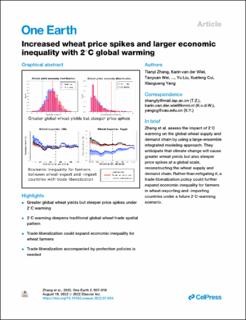| dc.contributor.author | Zhang, Tianyi | |
| dc.contributor.author | van der Wiel, Karin | |
| dc.contributor.author | Wei, Taoyuan | |
| dc.contributor.author | Screen, James | |
| dc.contributor.author | Yue, Xu | |
| dc.contributor.author | Zheng, Bangyou | |
| dc.contributor.author | Selten, Frank | |
| dc.contributor.author | Bintanja, Richard | |
| dc.contributor.author | Anderson, Weston | |
| dc.contributor.author | Blackport, Russell | |
| dc.contributor.author | Glomsrød, Solveig | |
| dc.contributor.author | Liu, Yu | |
| dc.contributor.author | Cui, Xuefeng | |
| dc.contributor.author | Yang, Xiaoguang | |
| dc.date.accessioned | 2024-02-06T13:57:55Z | |
| dc.date.available | 2024-02-06T13:57:55Z | |
| dc.date.created | 2022-09-08T12:21:41Z | |
| dc.date.issued | 2022 | |
| dc.identifier.citation | One Earth. 2022, 5 (8), 907-916. | en_US |
| dc.identifier.issn | 2590-3330 | |
| dc.identifier.uri | https://hdl.handle.net/11250/3115984 | |
| dc.description.abstract | Climate change poses complex impacts on the global wheat supply and demand chain. The impacts of climate change on average wheat yields are reasonably well studied, but its effects on yield variability and the associated economic consequences are poorly understood. Here, we show that future global wheat prices will exhibit steeper spikes at 2°C global warming (6.2% increase in the 95th percentile of global consumer price anomalies) despite a 1.7% increase in production given that CO2 fertilization benefits crops. Such economic stresses could be abated by trade liberalization with lower prices. However, on the supply side, trade liberalization has contrasting effects: the profitability of farmers in advanced economies can be maintained or even raised, but this will inevitably cause economic losses and inequalities for farmers in less-developed, wheat-importing countries. Agricultural trade liberalization accompanied by protection policies in developing countries would be beneficial for global food security in the threat of climate change. | en_US |
| dc.language.iso | eng | en_US |
| dc.publisher | CellPress | en_US |
| dc.rights | Navngivelse 4.0 Internasjonal | * |
| dc.rights.uri | http://creativecommons.org/licenses/by/4.0/deed.no | * |
| dc.title | Increased wheat price spikes and larger economic inequality with 2°C global warming | en_US |
| dc.title.alternative | Increased wheat price spikes and larger economic inequality with 2°C global warming | en_US |
| dc.type | Peer reviewed | en_US |
| dc.type | Journal article | en_US |
| dc.description.version | submittedVersion | en_US |
| dc.source.pagenumber | 907-916 | en_US |
| dc.source.volume | 5 | en_US |
| dc.source.journal | One Earth | en_US |
| dc.source.issue | 8 | en_US |
| dc.identifier.doi | 10.1016/j.oneear.2022.07.004 | |
| dc.identifier.cristin | 2049887 | |
| dc.relation.project | Norges forskningsråd: 260404 | en_US |
| cristin.ispublished | true | |
| cristin.fulltext | preprint | |
| cristin.qualitycode | 1 | |

